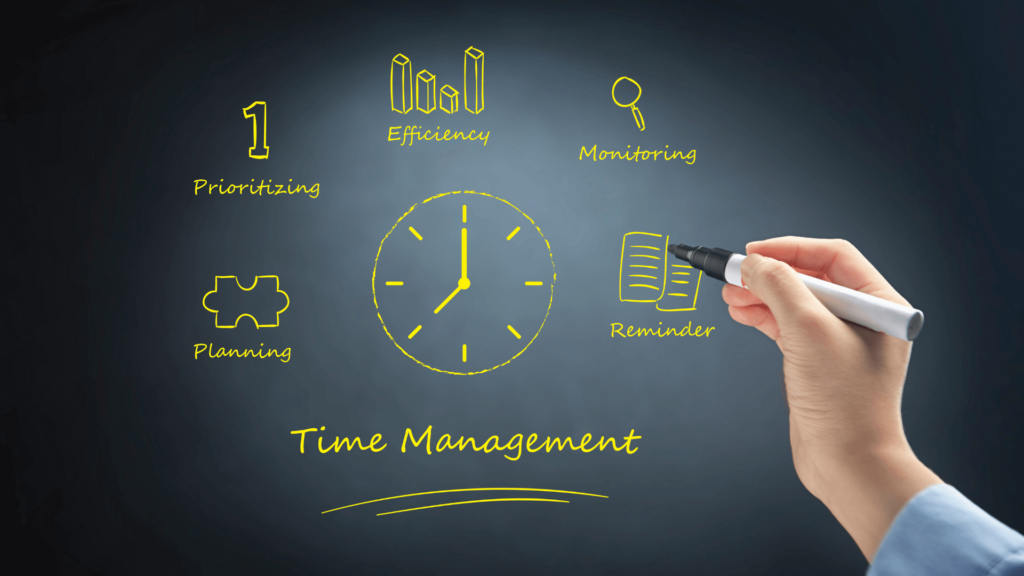Overcoming Poor Time Management: Effective Strategies for Better Productivity

- Set Clear Goals and Create a Timeline
- Prioritize Tasks and Activities
- Establish a Routine for Better Time Management
- Avoid Distractions that Can Hinder Productivity
- Practice the Four Ds: Do, Delegate, Defer, and Delete
- Avoid Multitasking and Focus on One Task at a Time
- Get Enough Sleep to Maintain Energy and Focus
- Don’t Feel Bad About Failing, Learn from Mistakes and Move Forward
- Know How to Spend Your Time Effectively
- Use Planning Tools to Stay Organized
- Delegate Tasks When Necessary
In today's fast-paced world, effective time management is crucial for individuals and businesses alike.
By implementing learning strategies for improving time management, you can increase productivity and achieve your goals more efficiently.
This article will explore various techniques and tips to help you better manage your time, prioritize tasks, and avoid distractions.
By incorporating these strategies into your daily routine, you can experience the benefits of increased productivity, reduced stress, and improved efficiency.
So, let's dive into the world of time management and unlock the secrets to making the most of your precious time.
Set Clear Goals and Create a Timeline
Realizing objectives and constructing a timeline are essential stages for optimizing time management and amplifying efficiency. When you have a definite vision of what you wish to accomplish, you can more judiciously select your jobs and allocate your time shrewdly.
By devising a timeline, you can break down your goals into smaller, more plausible tasks, enabling you to observe your advancement and stay on track.
With an unambiguous direction and timeline in place, you can concentrate your vigor on the most critical tasks that will bring you closer to your goals.
By establishing clear goals, you grant yourself a feeling of purpose and direction. This understanding allows you to make sensible decisions about how you expend your time and ensures that you are striving for meaningful results.
By constructing a timeline, you can establish due dates for each task, which aids in keeping you responsible and thwarts procrastination.
Moreover, having a timeline helps you to recognize potential impediments or regions where you may require additional resources or support, allowing you to pre-emptively address these problems and stay on course.
Constructing a timeline also assists you in regulating your workload more effectively. By splitting up your goals into smaller tasks and allotting them specific timeframes, you can better rank your activities.
This permits you to focus on the most important and urgent tasks first, guaranteeing that you are making progress towards your goals.
Additionally, having a timeline helps you to apportion your time prudently, allowing you to make room for unexpected tasks or disturbances without sacrificing the progress you are making toward your goals.
Furthermore, setting clear goals and creating a timeline can enhance your drive and productivity. When you have an unambiguous vision of what you want to achieve and a systematized plan to get there, you are more liable to stay focused and devoted.
The feeling of success you experience when you reach each checkpoint along the timeline can fuel your inspiration and propel you to keep working towards your goals.
By setting clear goals and creating a timeline, you can wield the power of time management to maximize your productivity and accomplish the results you desire.
Prioritize Tasks and Activities
Organizing and managing your tasks is key for optimizing time. Prioritizing the tasks that are most important and urgent allows for more efficient use of energy and resources.
To begin, pinpoint your highest-priority tasks and tackle them first.
This way, you can spend your efforts on the most meaningful objectives and make progress towards goals.
It is essential to prioritize tasks that are beneficial to your business and will contribute to overall productivity, as your time is precious.
Creating a to-do list is a great way to prioritize tasks. Put together all the tasks you need to complete and rank them based on importance and deadline.
This will make sure that you focus on the most pressing tasks first, rather than wasting time on activities that are less significant.
By arranging tasks in order of priority, you can ensure effective use of time and work on the most important tasks that will have the greatest impact on your business.
Additionally, it is beneficial to consider the consequences of not completing certain tasks. Assess what the effect could be on your business if a task was not completed in a timely manner.
By understanding the results of not prioritizing certain tasks, you can make smarter decisions about how to use your time and resources.
This will help you keep the focus on the activities that will have the most significant impact on your business and prevent wasting time on lesser critical activities.
To wrap up, prioritizing tasks and activities is not about doing everything at once or attempting to finish every task on your list.
It is about making well-thought-out choices about how to best utilize your time and resources.
By prioritizing tasks based on importance and urgency, you can guarantee that you are concentrating on the activities that will have the highest influence on your business and boost your overall productivity.
Establish a Routine for Better Time Management
Constructing a regimen can be a great way to improve your time management. By forming a habitual pattern, you can adeptly assign your time and make sure important tasks are finished.
Developing a routine aids in diminishing decision fatigue and permits you to concentrate on your priorities without wasting time on needless choice-making.
Additionally, a regimen provides structure and self-control, which are essential for keeping orderly and upholding productivity.
Whether it's beginning your day with a morning routine or allocating precise time blocks for different activities, forming a routine can significantly enhance your time management skills and eventually augment your productivity.
Instituting a routine for better time management also helps to reduce stress and burden. When you have a set schedule, you know what to anticipate and can arrange your day accordingly.
This removes the need to continually respond to unforeseen occurrences or continually shift your attention from one task to another.
By following a routine, you can address each task with a clear mind and better manage your time. This not only betters your productivity but also allows you to have a better work-life balance, as you can set aside specific time for work, personal activities, and rest.
Inadequate time management frequently leads to procrastination and a lack of productivity. However, by forming a routine, you can get around these challenges.
A routine assists in developing a sense of discipline and accountability, making it easier to start and complete tasks in a timely manner.
When you have a set schedule, you are less apt to put off tasks and more likely to stay focused and motivated. This consistency and structure enable you to make headway on your objectives and gain better results.
By constituting a routine for better time management, you can break the cycle of poor time and prepare yourself for success.
Moreover, establishing a routine enables you to identify and eradicate time-wasting activities. By analyzing your daily routine, you can pinpoint areas where time is being squandered and make essential adjustments.
This could involve cutting back on superfluous tasks, setting limits with distractions, or discovering ways to streamline your processes. By eliminating time-wasting activities and focusing on what is truly important, you can make the most of your time and increase your overall productivity.
To conclude, forming a routine for better time management is a powerful strategy that can significantly improve your productivity and effectiveness.
By crafting a consistent schedule, you can adeptly assign your time, decrease
Avoid Distractions that Can Hinder Productivity
Maximizing productivity and efficiency requires avoiding distractions.
Our digital age renders it easy to become sidetracked by notifications, emails, and other interruptions. Through conscious efforts to minimize distractions, one can stay centered on the task in question and accomplish it more rapidly.
A few ways to go about this include turning off unnecessary notifications, scheduling specific times to check and respond to emails, and forming a distraction-free workspace. By using these management strategies, one can curtail distractions and optimize productivity.
In addition to external diversions, it is important to set boundaries and communicate them effectively with colleagues, family, and friends. This will help to quell unnecessary interruptions and enable one to remain focused.
It is also significant to be cognizant of personal habits which could lead to distractions. If a habit of incessantly checking one’s phone or getting lost in social media has developed, consider implementing time limits or using apps that bar access to certain websites during work hours.
Proactive efforts to address potential distractions can create an environment more conducive to being productive.
Internal distractions can also impede productivity, such as negative thoughts, self-doubt, or lack of motivation. It is essential to recognize and address these internal distractions to maintain focus and productivity.
Mindfulness meditation, positive affirmations, and goal visualization are all techniques that can help to quell the mind and keep one on track.
Regular breaks and activities that revitalize and inspire one can also combat internal distractions. By managing both external and internal distractions, one can establish a more productive and focused work environment.
Finally, it is essential to be aware of the activities that waste time and can quickly consume one’s day. Examples include excessive meetings, unnecessary tasks, or spending too much time on low-priority activities.
Regularly evaluating tasks and activities can help to identify and eliminate time-wasting activities, thereby allowing for a more effective allocation of one’s time and energy.
This may involve delegating tasks to others, learning to decline non-essential commitments, or reevaluating priorities. Through mindfulness of time and avoidance of distractions, one can sharpen their time management skills and increase overall productivity.
Practice the Four Ds: Do, Delegate, Defer, and Delete
Maximizing productivity and improving time management can be achieved through the implementation of the Four Ds: Do, Delegate, Defer, and Delete. This strategy can help you make smart choices about how to allocate your time and focus on the most important tasks.
Do encourages you to act immediately on urgent tasks, eliminating delays and avoiding hindrances in your workflow.
Delegate allows you to leverage the abilities of others, freeing up your time for more critical matters while also promoting collaboration and balancing workloads.
Defer enables you to prioritize tasks based on their urgency and importance, ensuring that you are not overwhelmed by trying to complete everything at once.
Finally, Delete encourages you to discard activities that are not congruent with your goals or do not add value to your work.
This helps you streamline your workload and concentrate on tasks that have a meaningful impact. By practicing the Four Ds, you can benefit from enhanced time management and improved productivity.
The Four Ds offer a great way to advance your time management and increase your productivity.
Do helps you take prompt action on tasks that need to be done right away, preventing you from wasting time on less important work. Delegate is an effective tool for passing off tasks to those who are better suited to handle them, boosting the overall performance of your team.
Defer is beneficial when it comes to postponing tasks that can be done at a later time, allowing you to focus your attention on higher-priority items. Lastly, Delete enables you to get rid of activities that are not necessary or do not contribute to your goals, enabling you to maximize the impact of your efforts.
Overall, by leveraging the Four Ds, you can leverage the power of time management and optimize your productivity.
Avoid Multitasking and Focus on One Task at a Time
Committing to single-tasking can be a major boon to productivity.
Focusing exclusively on a single task allows us to give it our undivided attention, helping us to do better work more efficiently. Rather than being overwhelmed by a lengthy to-do list, we can break it down into separate tasks and tackle them one by one, allowing us to remain on track and make progress throughout the day.
To successfully adopt the habit of single-tasking, discipline, and self-awareness are key.
We must consciously avoid the urge to switch between tasks and remain committed to finishing one task before moving on to the next. To aid in this endeavor, it can be beneficial to create an ordered task list and allocate specific blocks of time for each task.
Establishing clear boundaries and dedicating focused time to each job helps us to evade the habit of multitasking and guarantee that we are fully engaged with the task at hand. The end result: enhanced productivity, amplified concentration, and a greater feeling of accomplishment at the end of the day.
Get Enough Sleep to Maintain Energy and Focus
Time management is a key component of living a productive and successful life. To ensure an optimal approach to managing our schedules, it is critical that we prioritize getting enough sleep.
A good night's rest is essential for boosting energy and focus and can help to increase our productivity and efficiency.
Without proper rest, cognitive abilities can suffer, leading to diminished output and a greater likelihood of mistakes. Moreover, inadequate sleep can cause stress levels to rise, making it difficult to stay composed when facing pressure.
By ensuring a sufficient amount of sleep, we can maintain our energy levels, stay alert, and approach tasks with a clear head.
Prioritizing sleep is thus an important part of any successful time management strategy. Adequate rest helps us start each day with a refreshed mindset, enabling us to make better decisions and complete tasks more efficiently.
Moreover, it is essential for keeping stress levels in check and maintaining a healthy work-life balance.
Remember, proper time management is about not only getting things done but also looking after our own well-being.
Don’t Feel Bad About Failing, Learn from Mistakes and Move Forward
Facing setbacks and errors should not be disheartening, but instead be seen as a chance to grow. To enhance our time management and productivity, embracing a growth mindset is essential.
We must not let missteps cause us to feel discouraged but rather use them as an opportunity to evaluate what went wrong and discern the lessons to be learned.
By reframing our mistakes and blunders as stepping stones to success, we can confront challenges with positive attitudes and a desire to continually develop and better our management skills.
Learning from mistakes is a key part of individual and professional development. We should capitalize on our failures, taking the time to recognize patterns and behaviors that could have led to undesirable outcomes.
With this understanding, we can make alterations, improve our approaches, and create effective time management strategies.
Through this iterative process of continual improvement, we can strengthen our management skills and work towards realizing our ambitions with greater efficiency and efficacy.
Thus, instead of being dispirited by failures, let them be your guides in improving time management and increasing productivity.
Know How to Spend Your Time Effectively
Maximizing productivity and improving time management starts with efficiently utilizing your time. A great way to start is by identifying the most crucial tasks and ranking them in order of importance.
Focusing on what matters most will help you make the most of your time and ensure that you are working towards your objectives.
Additionally, clearly defining your priorities allows you to dedicate resources and allocate time wisely, optimizing your efficiency and productivity.
Planning tools can be very beneficial when it comes to spending your time effectively.
These tools can be used to create schedules, set reminders, and monitor progress on various tasks and projects.
With the help of these tools, you can avoid wasting time and make the most of your available time.
Furthermore, staying organized can reduce stress and improve focus, aiding you in working more efficiently and productively.
Learning to delegate tasks is also key when it comes to managing your time.
By recognizing when certain tasks can be better handled by someone else, you can free up your time to focus on more important responsibilities. Not only does this spread the workload but it also allows you to leverage the skills and expertise of others, leading to better results.
It is important to remember that you don't have to do everything yourself and that delegating tasks can help you achieve your goals more efficiently.
In conclusion, knowing how to spend your time effectively is essential for maximizing productivity and improving time management.
Prioritizing tasks, utilizing planning tools, and delegating responsibilities can help you make the most of your available time and achieve better results.
By incorporating these strategies, you can experience the benefits of increased productivity, reduced stress, and improved efficiency in both your personal and professional life.
Use Planning Tools to Stay Organized
Maximizing productivity and managing time effectively can be achieved by utilizing planning tools.
These tools can help individuals stay organized and monitor their tasks, deadlines, and appointments.
Digital calendars, task management apps, and project management software provide users with the ability to construct schedules, set reminders, and apportion their time in an efficient manner. Visualizing workloads, prioritizing tasks, and allocating time are all possible with these tools, streamlining workflow and heightening responsibility.
A centralized repository of all important information makes these planning tools invaluable. Notes and memories are no longer relied upon, as users can store and access essential documents, contact information, and project details.
This saves time by eliminating the need to search and reduces the probability of a missed deadline or forgotten detail.
With all the important information at hand, individuals can make better decisions and work more productively.
Additionally, collaboration features of these tools allow team members to share documents, communicate, and track progress in unison, which encourages better teamwork and ensures everyone is on their page.
Delegate Tasks When Necessary
Strategizing to delegate tasks when necessary is key to improving time management and upping productivity. Allocating duties to those with the capability to complete them frees up your time to focus on tasks that require your expertise.
Doing so not only lightens your burden but also grants your team the opportunity to grow professionally. By delegating tasks, you are able to prioritize your efforts on high-value activities and still achieve results in a timely fashion.
Delegation also encourages collaboration and teamwork. It fosters an atmosphere of open communication and trust amongst your team as they join forces to reach common objectives.
Appointing tasks instills a sense of shared responsibility and accountability, allowing you to benefit from the diverse skills and strengths of your team and come up with innovative solutions for successful outcomes.
By delegating tasks properly, you not only optimize your own productivity but empower your team to excel.
It is important to assign tasks thoughtfully and strategically. A thorough understanding of your team members' capabilities, strengths, and areas for development is necessary. Assigning tasks that align with their skills and interests will improve their performance and job satisfaction.
Providing clear instructions, guidelines, and expectations when delegating tasks is essential to ensure that they are completed to the desired standard.
Keeping in touch and providing feedback is also instrumental in monitoring progress, tackling any issues, and offering support when needed.
When delegating tasks judiciously, you are able to optimize time management, energize your team, and ultimately boost productivity.
Leave a Reply




Related Posts